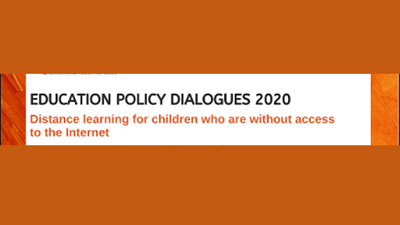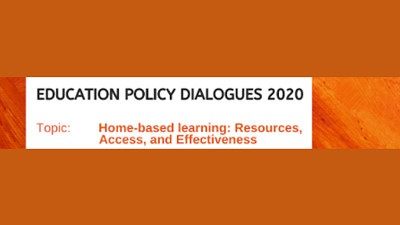
Held on May 16, 2020, via Zoom. Video: https://www.facebook.com/EduForumLK/videos/726016001268499/ Presentation (Who has Access?): https://lirneasia.
It is heartening to note that the decision to reopen schools on May 11th has been reconsidered positively. Exposing 4.3 million school children to a potential resurgence of the virus with no clear plan would have been dangerous, when we still haven’t had a straight 48-72 hours without a single Covid patient being reported. Sanitizing all schools effectively would need time and resources. Overcrowding of classrooms in urban/popular schools, inability to implement safe-distancing methods and lack of adequate facilities for hand-hygiene, are all reasons to consider before announcing re-opening.
Capitalizing on the need to switch to distance learning (DL) Sri Lanka like all countries had to find alternate methods of education when school closure became a necessity during Covid 19. Many countries in the West & East seamlessly switched to e-learning & online education, since their curricula & syllabuses were already posted on the education websites, and e-learning had been practiced interspersed with face-to-face learning in class, even before Covid. Good example is Singapore, where once a week, e-learning had been a practice for several grades. So an abrupt and total switch was effortless for them. What’s the story with Sri Lanka?
May 11, 2020 මà·à¶»à·Šà¶à·” 12ද෠හදිසියේ පà·à·ƒà¶½à·Š වස෠දà·à¶¸à·“මà¶à·Š සමග à·à·Šà¶»à·“ ලංකà·à·€à·š අධ්යà·à¶´à¶± පද්ධà¶à·’ය à¶à·”à·… අර්බුදයක් නිර්මà·à¶«à¶º විය. එක රà·à¶ºà·’න් à¶à¶¸ ඉගà·à¶±à·Šà·€à·“ම් ක්රමය අන්à¶à¶»à·Šà¶¢à·à¶½à¶º පà·à¶¯à¶š කරගෙන දුරස්ථ ආකà·à¶»à¶ºà¶§ à·„à·à¶©à¶œà·ƒà·Šà·€à· ගà·à¶±à·“මට ගුරුවරුන්ට සිදු විය. අගà·à·ƒà·Šà¶à·” මà·à·ƒà¶ºà·š සිට ඉදිරියට පà·à·€à·à¶à·Šà·€à·™à¶± පහ à·à·Šà¶»à·šà¶«à·’යේ à·à·’ෂ්යà¶à·Šà·€ විභà·à¶œà¶º, අ.පො.à·ƒ.
May 12, 2020 With the sudden closure of schools on March 12th, the Sri Lankan education system plunged into a crisis. Overnight teachers had to gear themselves for on-line teaching and other methods of distance education. The GOSL swiftly moved in to address the concerns of students preparing for Grade 5 Scholarship examination and Ordinary Level and Advanced level examinations, due to start from August, by telecasting lessons for those students. However, the schools were not at all prepared for a distance learning mode, and hence innovation became an urgent necessity to reach out to the full student population. Further, Covid-19 is not going be fully curtailed anytime soon.
The primary source of digital resources in Estonia is e-Koolikott (“e-Schoolbagâ€), a nationwide online library of more than 20,000 educational resources. Teachers, subject specialists, universities, and private publishers can all post resources to e-Schoolbag, and groups of subject-area experts are responsible for reviewing the resources for quality. Teachers can then use and adapt these resources for their lessons, including organizing and saving related resources into personal “learning kits.†Parents and guardians also have access to e-Schoolbag to support children’s learning at home, as was the case before school closures. A second initiative is a list of online learning resources by subject, purpose, or grade span, including tools developed by Estonia’s robust educational technology sector.
As part of the on-going discussions on Home-Based-learning, the EFSL team had an informative discussion with Yarl IT Hub, Mr Balathasan Sayanthan on the innovations introduced through their digital learning platforms and the response from students during this Covid period. The platform has delivered content to large numbers of students for Tech Learning, Advanced level revision as well as for Grade 5 scholarship students. Yarl IT Hub is a not-for-profit social enterprise managed by a group of talented young tech-people, which also collaborates with the Northern Province Education Department on specific projects.

Held on May 2nd, 2020, via Zoom Video: https://www.facebook.com/EduForumLK/videos/726016001268499/ Presentation: The event was attended by 34 participants including teachers from several districts in SL, representatives from the Open University, non-governmental actors in education, private sector representatives, those interested in special education and those from the IT sector. The main purpose of the Dialogue was to exchange ideas, share best practices and discuss successful models used for distance education, e-learning and other forms of HBL systems, during the Covid crisis. With sudden schools closure, teachers had to gear themselves for on-line teaching and other methods of distance education very rapidly.
Zoom Dialogue on “Self-directed learning” in the time of Corona and beyond (In Sinhala) with the participation of the nascent Teachers Forum of EFSL was held on April 17th, 2020.  The EFSL team was joined by Mrs. Yamuna Rathnayake an award-winning ICT teacher (Grades 6-11 ) from Ranabima Royal in Gannoruwa spoke about her experience connecting with students using WhatsApp during this school closure. She described how ‘ Sisu Pawra e-learning’  grouped students into clusters, and how through each cluster leader she was able to share teaching material with all the class students. Students either used their own smartphones and those of their parents or relatives.
In her column why character education is an imperative for Sri Lanka, HGS Premarathna, or Sajitha Preamrathna argues eloquently that good character is more important than ever, and posits, as the title indicates, it should be taught in schools. I have reservations about both arguments. In the first instance, she quotes Andrew Lickona who justifies the need for character education. According to Lickona, “There is a clear and urgent need [for character education]. Young people are increasingly hurting themselves and others and are decreasingly concerned about contributing to the welfare of others.
 Held on May 16, 2020, via Zoom. Video: https://www.facebook.com/EduForumLK/videos/726016001268499/ Presentation (Who has Access?): https://lirneasia.
Held on May 16, 2020, via Zoom. Video: https://www.facebook.com/EduForumLK/videos/726016001268499/ Presentation (Who has Access?): https://lirneasia.  Held on May 16, 2020, via Zoom. Video: https://www.facebook.com/EduForumLK/videos/726016001268499/ Presentation (Who has Access?): https://lirneasia.
Held on May 16, 2020, via Zoom. Video: https://www.facebook.com/EduForumLK/videos/726016001268499/ Presentation (Who has Access?): https://lirneasia.  Held on May 2nd, 2020, via Zoom Video: https://www.facebook.com/EduForumLK/videos/726016001268499/ Presentation: The event was attended by 34 participants including teachers from several districts in SL, representatives from the Open University, non-governmental actors in education, private sector representatives, those interested in special education and those from the IT sector. The main purpose of the Dialogue was to exchange ideas, share best practices and discuss successful models used for distance education, e-learning and other forms of HBL systems, during the Covid crisis. With sudden schools closure, teachers had to gear themselves for on-line teaching and other methods of distance education very rapidly.
Held on May 2nd, 2020, via Zoom Video: https://www.facebook.com/EduForumLK/videos/726016001268499/ Presentation: The event was attended by 34 participants including teachers from several districts in SL, representatives from the Open University, non-governmental actors in education, private sector representatives, those interested in special education and those from the IT sector. The main purpose of the Dialogue was to exchange ideas, share best practices and discuss successful models used for distance education, e-learning and other forms of HBL systems, during the Covid crisis. With sudden schools closure, teachers had to gear themselves for on-line teaching and other methods of distance education very rapidly. 